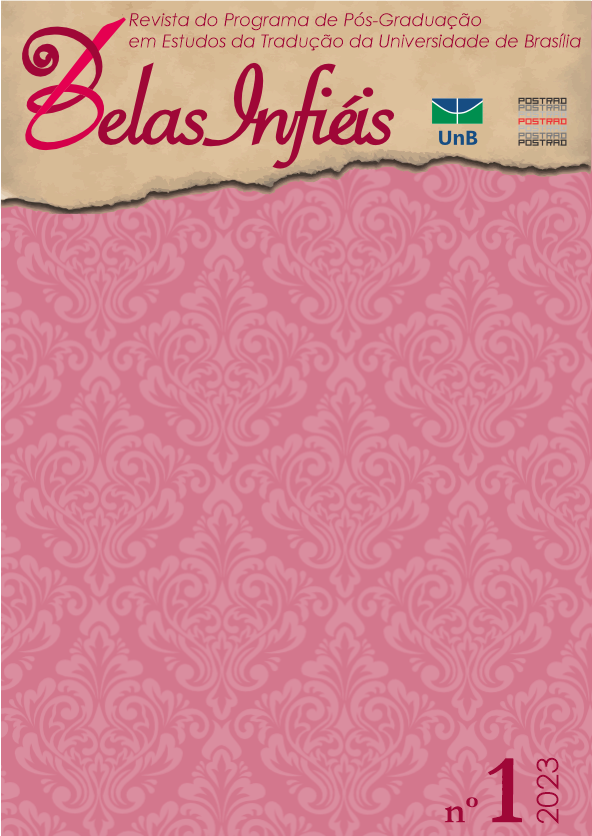Dévoilement, uma nãotradução literária do Apocalipse
DOI:
https://doi.org/10.26512/belasinfieis.v12.n1.2023.44679Palabras clave:
Jacques Brault. Nãotradução. Retradução literária das Escrituras. Bíblia dos escritores. Livro do Apocalipse.Resumen
Este artigo pretende analisar alguns mecanismos da nãotradução – a poética tradutória do escritor québécois Jacques Brault – empregados em um texto sensível. A nãotradução estabelece uma relação enunciativa tríplice entre o original, a tradução e o texto final. Assim, à voz de João de Patmos juntou-se a de Brault para – por meio de procedimentos característicos de referida poética – dissipar o esoterismo que a tradição conferiu ao livro do Apocalipse com suas diversas retraduções. Trata-se de uma reescrita que, ao negligenciar a sua filiação bíblica, fez com que o caráter de “testemunho” do Apocalipse – que é dado à obra por seu autor – determinasse as escolhas nãotradutórias. Visto por Brault como um poderoso poema de estatura épica, o derradeiro tomo das Escrituras foi objeto de uma nãotradução que deixou de lado a sua ascendência religiosa e se concentrou em seu aspecto poético. O resultado é Dévoilement [Revelação], uma nãotradução literária daquele que é considerado um dos mais difíceis e polêmico livro da Bíblia.
Descargas
Citas
Aitken, A. (2001). La Bible au risque de la traduction. Entrevue avec Jacques Brault et André Myre. Relations, 673, 28-31. https://cjf.qc.ca/revue-relations/publication/article/la-bible-au-risque-de-la-traduction/
Boyer, F. (2001). Les livres, la Bible. In La Bible (pp.14–23). Bayard.
Boyer, F. (2002). La Bible, notre exil. POL.
Brault, J. (1975). Poèmes des quatre côtés. Le Noroît.
Brault, J. (1989). Sur la traduction de la poésie. In J. Brault, La poussière du chemin, essais (pp. 201–215). Boréal.
Brault, J. (1994). Au cœur de la critique. In J. Brault, Chemin faisant (pp. 59–71). Les Éditions du Boréal.
Brault, J. (1998). Transfigurations. Le Noroît.
Brault, J. (2012). Clair comme la nuit. In J. Brault, Chemins perdus, chemins trouvés (pp. 271–273). Boréal.
Côté, N. (2005). « Si je Voyage vers toi mal rafistolé » : Brault le « non-traducteur ». In A. Whitfield (Dir.), Le métier du double, portraits de traductrices et traducteurs littéraires (p. 65–96). Fides.
Cummings, E. E. (1991). Complete Poems, 1904–962. Liveright.
Faleiros, A. S. (2022). Nas sendas de Jacques Brault, antologia de poemas 1965–2006. Editora UnB.
Gilbert, P. (2001). Une traduction pour mémoire. In La Bible (pp. I–V). Bayard.
Houaiss, A. (2001). Dicionário Houaiss da língua portuguesa. Objetiva.
Jeuge-Maynart, I. (Dir.) (2008). Le petit Larousse illustré. Larousse.
La Bible (J. Brault, & J.-P. Prévost, Trad.). (2001). Dévoilement (pp. 2393–2416). Bayard.
La Bible (Traduction officielle par la Commission Épiscopale Francophone). (2013). Livre de l’Apocalypse (pp. 4086–4135). Mame.
Lassave, P. (2006). Les tribulations d’une Bible dans les médias. Archives de sciences sociales des religions, 134, 1–21. https://doi.org/10.4000/assr.3409
Lefevere, A. (2017). Translation, rewriting and the manipulation of literary frame. Routledge.
Lizorkin-Eyzenberg, E. (2021). Jewish studies for Christians. Saint James Vicariate for Hebrew speaking Catholics in Israel. https://www.catholic.co.il/?cat=&view=article&id=8951&m=
Marcotte, G. (1987). Poésie de novembre. Voix et images, 12(2), 239–249. https://doi.org/10.7202/200629ar
Meschonnic, H. (2004). Un coup de Bible dans la philosophie. Bayard.
Prévost, J. P. (2018). Apocalypse de Jean, introduction et notes. In La Bible (pp. 2590–2593), Bayard.
Pym, A. (2017). Explorando as teorias da tradução. Perspectiva.
Rumeau, D. (2014). Jacques Brault, l’intempestif. Littératures, (70), 151–161. https://doi.org/10.4000/litteratures.297
Simon, S. (2000). Pratiques déviantes de la traduction. Francophonies d’Amérique, (10), 159–166. https://doi.org/10.7202/1005089ar
Stradioto-Casolato, A. (2022). Nãotradução: uma poiética tradutória perturbadora. Tradterm, (41), 5–29, https://www.revistas.usp.br/tradterm/article/view/185543/179968
Suchet, M. (2017). Jacques Brault et la nontraduction, un Unland original. TRANS-, Revue de littérature générale et comparée, (22), 1–13. http://journals.openedition.org/trans/1646
Tashiro-Perez, E. A. (2011). Os teniwoha nos primeiros tratados do poema renga da era medieval japonesa. Estudos japoneses, (31), 27–43. https://doi.org/10.11606/issn.2447-7125.v0i31p27-44
Descargas
Publicado
Cómo citar
Número
Sección
Licencia
Derechos de autor 2023 CC BY

Esta obra está bajo una licencia internacional Creative Commons Atribución 4.0.
Copyright Statement
Given the public access to this journal, the texts are free to use but requires the recognition of the original authorship and initial publication in this journal to be properly stated.
The journal allows the use of works published for non-commercial purposes, including the right to submit the work to publicly accessible databases. Published contributions are the sole and exclusive responsibility of the author(s).
- When submitting papers to be evaluated by the Belas Infiéis journal, the author(s):
- Declare that the contents of the contributions are original and of their original creation, being entirely responsible for their content if there is an objection by third parties.
- Claim to be aware that they should not commit academic plagiarism.
- Declare that the manuscript has not been published, completely or partially, in Portuguese or another language. If it is a translation it should be submitted to the Translated Articles section.
- Declare that the manuscript is not being evaluated by other journals.
- Declare that the manuscript was not submitted to another journal simultaneously.
- Commit(s) to inform the journal of any kind of error or inaccuracy in their contribution (published, in evaluation or in editing) and to collaborate with the editors to make due corrections of the article (when in evaluation or editing) or erratum/retraction (after publication).
- Declare that there is no conflict of interest regarding the published work.
- Authorize its release if it is accepted for publication without any kind of monetary compensation.
- Agree to assign non-exclusive rights to publication to the magazine, remaining free to make their contribution available in other media as long as the publication of the first version in Belas Infiéis magazine is mentioned. They also authorize Belas Infiéis to assign their texts for reproduction in content indexers, virtual libraries and similar platforms.
- Maintain copyright and grant the journal the right of first publication, the work being licensed under theCreative Commons Attribution License.
- Is/Are allowed and encouraged to publish and distribute their work online after the editorial process, which may increase the impact and citation of the published work.
- Authorize the editorial team to make textual adjustments and to adapt the article to the publication rules, when necessary.



















